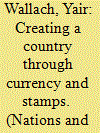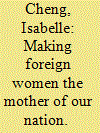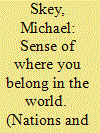| Srl | Item |
| 1 |
ID:
102832


|
|
|
|
|
| Publication |
2011.
|
| Summary/Abstract |
Recent studies have examined the use of currency and stamps for nation-building in various contexts, with these artefacts seen as vehicles for indoctrination and gaining legitimacy by ruling elites - as a form of "banal nationalism". This article goes further to argue that in moments of geopolitical upheaval, these symbolic artefacts can play a crucial role in shaping the very framework of nationhood. This article focuses on the Middle East during World War I and its aftermath, and on British efforts to shape public opinion through the issuing of Palestine postage stamps and currency (1920-7), which were intended to convey Britain's commitment to Zionism. Parallels are drawn to the introduction of Arab stamps and flags during the Arab Revolt (1916-18). The benefit to Zionist nation-building and "Hebrew Revival" is discussed, as well as the strikingly different reactions of local constituencies - Arabs and Jews - to the political message of these symbolic objects.
|
|
|
|
|
|
|
|
|
|
|
|
|
|
|
|
| 2 |
ID:
117932


|
|
|
|
|
| Publication |
2013.
|
| Summary/Abstract |
Citizenship awarding is politicised. Conceiving female marriage migration as a national threat, Taiwan's citizenship legislation is consciously designed and purposefully utilised to achieve exclusion and assimilation. Driven by a nationalistic impetus, it shows how Taiwan imagines itself as a modern, prosperous and homogenous nation and projects upon the immigrant outsiders as a threat to its self-identity. Examined through immigrant women's lived experiences, this citizenship legislation is biased by gender, class and ethnicity. The implementation of the legislation is not only an example of symbolic politics but also banal nationalism realised at grassroots level in the private domain. Immigrant women's lived experiences show that exclusion and assimilation stemmed from banal nationalism is not just an operation of symbolic politics but is also enmeshed with their everyday life.
|
|
|
|
|
|
|
|
|
|
|
|
|
|
|
|
| 3 |
ID:
099846


|
|
|
|
|
| Publication |
2010.
|
| Summary/Abstract |
The significance of national forms of imagination and organisation has been increasingly questioned in an era of rapid globalisation. While theoretically stimulating, those who stress the importance of global mobility and sociability sometimes overlook what well-established, "thick" attachments to the nation offer to disparate individuals, notably in terms of anchoring subjectivity. This first part of this paper explores how debates around belonging in England continue to define certain "ethnic" groups as more or less national, because they embody certain traits, practices or norms. It is then suggested that those who claim, and are treated as if, they belong "without question" may be offered a key sense of material and ontological security that is underpinned through routine practices, symbolic forms and institutional arrangements. The second section looks to evidence this argument by exploring how challenges to this ontological order, which focus on the agency of "perceived" others in relation to everyday spaces, practices and material objects, are debated and resisted.
|
|
|
|
|
|
|
|
|
|
|
|
|
|
|
|